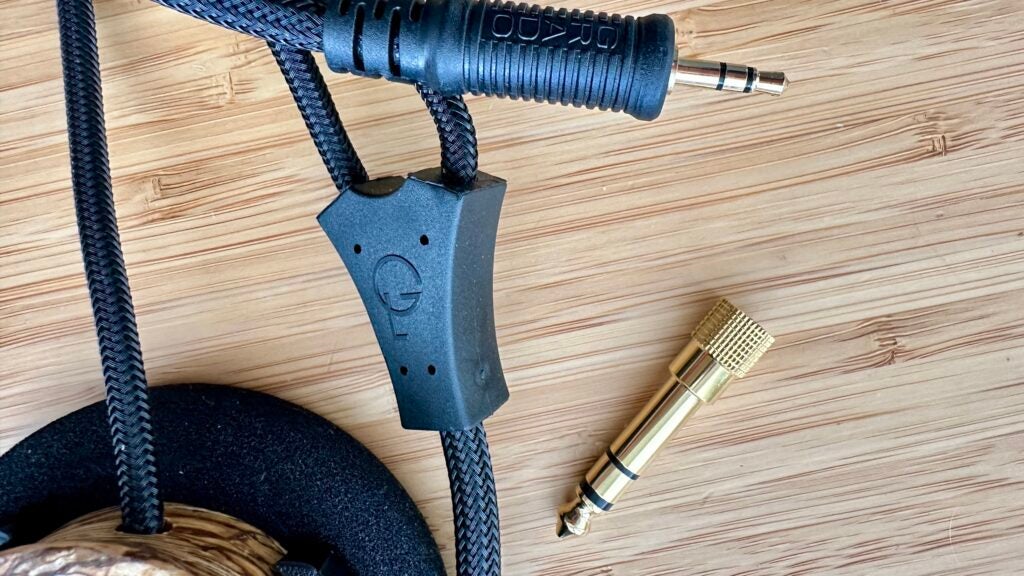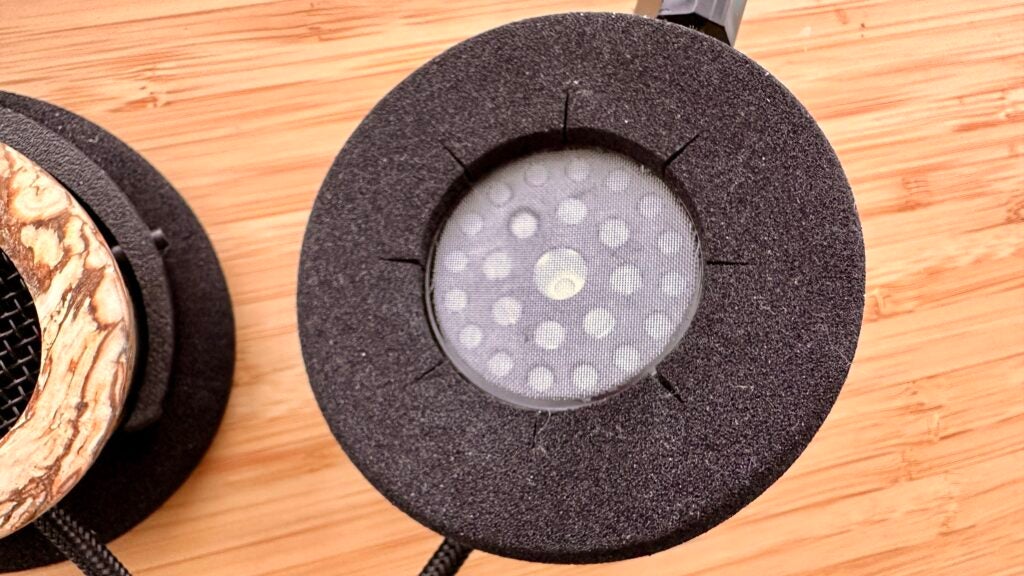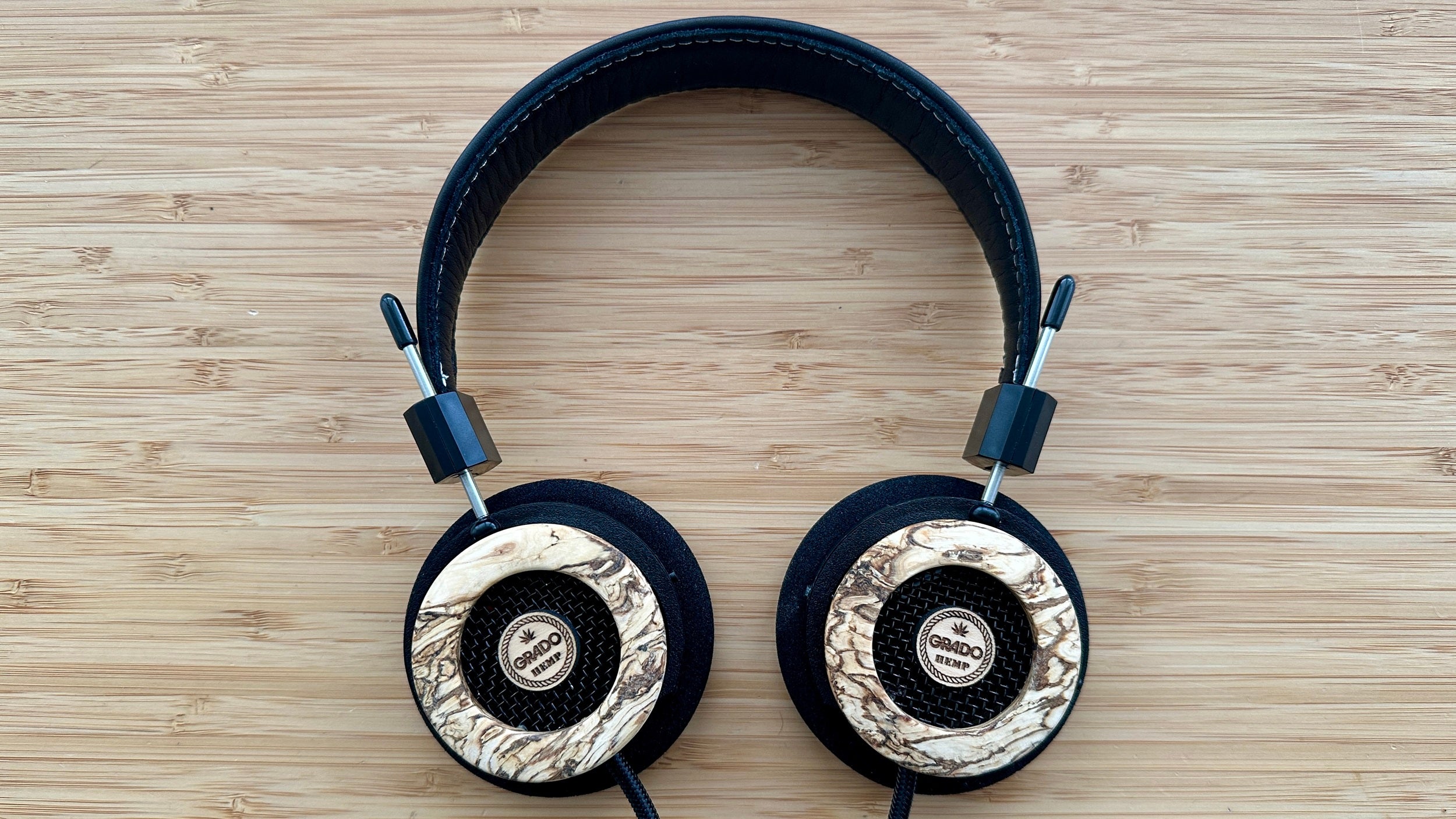Verdict
By their passive, hard-wired nature the Grado Reference Series Hemp are something of a one-trick pony – but what a trick it is.
Pros
- Big, organised, and energetic sound
- Interesting choice of materials
- Light, and comfortable (for a while)
Cons
- Don’t look or feel all that special
- Not too comfortable for longer sessions
- Unhelpful cable
-
Drivers44mm dynamic drivers -
Jacks3.5mm and 6.3mm terminations -
DesignHemp and maple housings
Introduction
Grado introduced its Reference Series Hemp wired open-backed over-ear headphones as a limited edition back in 2020.
But while this is a company that’s determined to do things its own way, it’s not oblivious to market forces – and so the popularity of the limited edition has led to this: an un-limited edition.
The Reference Series Hemp are now on general, ongoing sale – because as far as hemp is concerned, it seems, it’s impossible to have too much of a good thing.
Availability
The Grado Reference Series Hemp are on sale priced at £479. In America they cost $420 (partly for the LOLs, presumably), while in Australia they go for AU$799.
This is approaching serious money for a pair of wired over-ear headphones, but of course the Reference Series Hemp aren’t your only choice. So there needs to be a bit more about them than simply some relatively exotic materials…
Design
- Hemp and maple drier housings
- Quite coarse foam earpads
- Leather headband
As with every pair of over-ear headphones, design fundamentally extends to creating a frame from which to hang a couple of speaker drivers above your ears. And with every pair of Grado over-ear headphones, design really doesn’t extend much further than that.
The contact points of the Reference Series Hemp are familiar from many Grado models. The headband is a metal strip, grudgingly covered with leather and padded about as minimally as is possible. The earpads are flat foam items – and it’s not the finest grade of foam you ever encountered, either.

This hanger arrangement loads a lot of the headphones’ modest 218g weight onto the top of the user’s ears and is a big part of the reason the Hemp become uncomfortable a little more readily than many competing designs.
Adjusting the headband comes via a couple of friction pole adjusters, which I am confident is the most agricultural method of adjusting fit in the whole of headphone-land. A simple yoke arrangement allows just a little movement of the earpads relative to your ears, while at the back of the hemp-and-maple wooden speaker housing (which is the most attention-grabbing aspect of the way these headphones are designed) is an open metal mesh.

Features
- 13Hz – 28kHz frequency response
- 44mm dynamic drivers
- 177mm cable
These are passive, hard-wired headphones of the old school – and consequently features are pretty thin on the ground.
Sound is delivered by a pair of 4mm full-range dynamic drivers capable, according to Grado, of creating a frequency response of 13Hz – 28kHz. Each hemp-and-maplewood driver housing is hard-wired using the heavy, braided eight-core cable familiar from any number of Grado models from the recent(ish) past – it’s bulky, prone to twisting in on itself, and not remotely helpful when it comes to keeping your listening space neat and tidy.

It’s worth noting that it’s really effective when it comes to doing the business, though, so I probably shouldn’t be so snippy about it. And Grado has done the sensible thing in that it’s terminated the cable in a 3.5mm jack and provided a 6.3mm adapter in the packaging.
Previously, Grado used a 6.3mm termination, which meant providing a big and unwieldy 3.5mm adapter – which in turn made the cable more recalcitrant than ever.
Sound Quality
- Spacious, direct, and convincing sound
- Plenty of detail and insight available
- Prioritises fun as much as analysis
It doesn’t take much of a leap of imagination on my part to guess that you’re considering spending this sort of money on wired headphones because you have a high-quality source of music or two you wish to exploit. You’re not just going to plug them straight into your laptop, surely?
Actually, a laptop is OK – as long as there’s a good DAC/headphone amp in line between it and the Grado headphones. Arranged this way, and with a nice big 16-bit/96kHz FLAC file of Loveless by My Bloody Valentine playing, the Reference Series Hemp are a straightforward pleasure to listen to.

At every stage of the frequency range, the Grado are naturalistic and convincing in their tonality – and they reveal a remarkable amount of detail at the same time. No matter if it’s a fleeting, barely-there occurrence at the edge or the back of the soundstage, it’s identified and given the appropriate amount of weighting.
And that soundstage itself is being organised, properly defined, and confidently described – even in busy or dense recordings (and this one is most certainly dense), the Hemp lay each individual strand of a recording out with real positivity.
The journey from the top of the frequency range to the bottom isn’t absolutely smooth – these headphones, in the established Grado manner, push the midrange forward just slightly. But that’s a trait rather than a flaw, and when the midrange in question communicates with such directness and articulacy, it’s the opposite of a bad thing.
Below there, low frequencies punch with real determination, and are just as detailed – especially where texture is concerned – as everything that happens above them. The top of the frequency range, meanwhile, is similarly substantial, and similarly detailed – there’s proper bite and attack to treble sounds, but they never threaten to get unruly. And that’s true even if you like to listen at very high volumes.
You won’t, though, unless there’s no one anywhere near you. The Grado Reference Series Hemp’s open-backed configuration means they’re almost as loud to be on the outside of as they are when you’re inside.

The attack and decay of individual sounds is observed keenly. And this level of control at the bottom end, where the start/stop of bass sounds is so well controlled, means that rhythmic expression is very decent, and even the wonkiest tempos present no significant challenge.
All this talk of sky-high detail levels should make it obvious that the Hemp do very good work with the harmonic variations and minor dynamic shifts apparent in instruments or voices. But they’re equally adept when it comes to the bigger dynamic variable where volume and/or intensity are concerned. There a plenty of them during the course of the My Bloody Valentine album, and the Grado track each one with purpose, able to put significant distance between the gentle and the forceful.
Latest deals
Should you buy it?
You value an open, revealing and entertaining sound above all other considerations
If you’re listening alone (so their leaky nature isn’t an issue), the Grado Reference Series Hemp are, on a pound-for-pound basis, among the most straightforwardly enjoyable headphones around
You have other considerations beyond sound quality
Perceived value is negligible, they don’t stay as comfortable as they should for as long as they should, and the cable they’re attached to has a mind of its own
Final Thoughts
I knew there had to be more to hemp as a material for headphones than some cheap and obvious puns – and for once I was right. The properties of hemp, when combined with maple, seem to result in a greater sense of space and air than plenty of other materials can muster – even other woods. I am, though, convinced that the fact they cost $420 in America is no coincidence…
How we test
We test every set of headphones we review thoroughly over an extended period of time. We use industry standard tests to compare features properly. We’ll always tell you what we find. We never, ever, accept money to review a product.
Find out more about how we test in our ethics policy
Tested with real world use
FAQs
There are 3.5mm and 6.3mm terminations available with the Hemp headphones.
Verdict
By their passive, hard-wired nature the Grado Reference Series Hemp are something of a one-trick pony – but what a trick it is.
Pros
- Big, organised, and energetic sound
- Interesting choice of materials
- Light, and comfortable (for a while)
Cons
- Don’t look or feel all that special
- Not too comfortable for longer sessions
- Unhelpful cable
-
Drivers44mm dynamic drivers -
Jacks3.5mm and 6.3mm terminations -
DesignHemp and maple housings
Introduction
Grado introduced its Reference Series Hemp wired open-backed over-ear headphones as a limited edition back in 2020.
But while this is a company that’s determined to do things its own way, it’s not oblivious to market forces – and so the popularity of the limited edition has led to this: an un-limited edition.
The Reference Series Hemp are now on general, ongoing sale – because as far as hemp is concerned, it seems, it’s impossible to have too much of a good thing.
Availability
The Grado Reference Series Hemp are on sale priced at £479. In America they cost $420 (partly for the LOLs, presumably), while in Australia they go for AU$799.
This is approaching serious money for a pair of wired over-ear headphones, but of course the Reference Series Hemp aren’t your only choice. So there needs to be a bit more about them than simply some relatively exotic materials…
Design
- Hemp and maple drier housings
- Quite coarse foam earpads
- Leather headband
As with every pair of over-ear headphones, design fundamentally extends to creating a frame from which to hang a couple of speaker drivers above your ears. And with every pair of Grado over-ear headphones, design really doesn’t extend much further than that.
The contact points of the Reference Series Hemp are familiar from many Grado models. The headband is a metal strip, grudgingly covered with leather and padded about as minimally as is possible. The earpads are flat foam items – and it’s not the finest grade of foam you ever encountered, either.

This hanger arrangement loads a lot of the headphones’ modest 218g weight onto the top of the user’s ears and is a big part of the reason the Hemp become uncomfortable a little more readily than many competing designs.
Adjusting the headband comes via a couple of friction pole adjusters, which I am confident is the most agricultural method of adjusting fit in the whole of headphone-land. A simple yoke arrangement allows just a little movement of the earpads relative to your ears, while at the back of the hemp-and-maple wooden speaker housing (which is the most attention-grabbing aspect of the way these headphones are designed) is an open metal mesh.

Features
- 13Hz – 28kHz frequency response
- 44mm dynamic drivers
- 177mm cable
These are passive, hard-wired headphones of the old school – and consequently features are pretty thin on the ground.
Sound is delivered by a pair of 4mm full-range dynamic drivers capable, according to Grado, of creating a frequency response of 13Hz – 28kHz. Each hemp-and-maplewood driver housing is hard-wired using the heavy, braided eight-core cable familiar from any number of Grado models from the recent(ish) past – it’s bulky, prone to twisting in on itself, and not remotely helpful when it comes to keeping your listening space neat and tidy.

It’s worth noting that it’s really effective when it comes to doing the business, though, so I probably shouldn’t be so snippy about it. And Grado has done the sensible thing in that it’s terminated the cable in a 3.5mm jack and provided a 6.3mm adapter in the packaging.
Previously, Grado used a 6.3mm termination, which meant providing a big and unwieldy 3.5mm adapter – which in turn made the cable more recalcitrant than ever.
Sound Quality
- Spacious, direct, and convincing sound
- Plenty of detail and insight available
- Prioritises fun as much as analysis
It doesn’t take much of a leap of imagination on my part to guess that you’re considering spending this sort of money on wired headphones because you have a high-quality source of music or two you wish to exploit. You’re not just going to plug them straight into your laptop, surely?
Actually, a laptop is OK – as long as there’s a good DAC/headphone amp in line between it and the Grado headphones. Arranged this way, and with a nice big 16-bit/96kHz FLAC file of Loveless by My Bloody Valentine playing, the Reference Series Hemp are a straightforward pleasure to listen to.

At every stage of the frequency range, the Grado are naturalistic and convincing in their tonality – and they reveal a remarkable amount of detail at the same time. No matter if it’s a fleeting, barely-there occurrence at the edge or the back of the soundstage, it’s identified and given the appropriate amount of weighting.
And that soundstage itself is being organised, properly defined, and confidently described – even in busy or dense recordings (and this one is most certainly dense), the Hemp lay each individual strand of a recording out with real positivity.
The journey from the top of the frequency range to the bottom isn’t absolutely smooth – these headphones, in the established Grado manner, push the midrange forward just slightly. But that’s a trait rather than a flaw, and when the midrange in question communicates with such directness and articulacy, it’s the opposite of a bad thing.
Below there, low frequencies punch with real determination, and are just as detailed – especially where texture is concerned – as everything that happens above them. The top of the frequency range, meanwhile, is similarly substantial, and similarly detailed – there’s proper bite and attack to treble sounds, but they never threaten to get unruly. And that’s true even if you like to listen at very high volumes.
You won’t, though, unless there’s no one anywhere near you. The Grado Reference Series Hemp’s open-backed configuration means they’re almost as loud to be on the outside of as they are when you’re inside.

The attack and decay of individual sounds is observed keenly. And this level of control at the bottom end, where the start/stop of bass sounds is so well controlled, means that rhythmic expression is very decent, and even the wonkiest tempos present no significant challenge.
All this talk of sky-high detail levels should make it obvious that the Hemp do very good work with the harmonic variations and minor dynamic shifts apparent in instruments or voices. But they’re equally adept when it comes to the bigger dynamic variable where volume and/or intensity are concerned. There a plenty of them during the course of the My Bloody Valentine album, and the Grado track each one with purpose, able to put significant distance between the gentle and the forceful.
Latest deals
Should you buy it?
You value an open, revealing and entertaining sound above all other considerations
If you’re listening alone (so their leaky nature isn’t an issue), the Grado Reference Series Hemp are, on a pound-for-pound basis, among the most straightforwardly enjoyable headphones around
You have other considerations beyond sound quality
Perceived value is negligible, they don’t stay as comfortable as they should for as long as they should, and the cable they’re attached to has a mind of its own
Final Thoughts
I knew there had to be more to hemp as a material for headphones than some cheap and obvious puns – and for once I was right. The properties of hemp, when combined with maple, seem to result in a greater sense of space and air than plenty of other materials can muster – even other woods. I am, though, convinced that the fact they cost $420 in America is no coincidence…
How we test
We test every set of headphones we review thoroughly over an extended period of time. We use industry standard tests to compare features properly. We’ll always tell you what we find. We never, ever, accept money to review a product.
Find out more about how we test in our ethics policy
Tested with real world use
FAQs
There are 3.5mm and 6.3mm terminations available with the Hemp headphones.
























